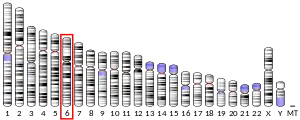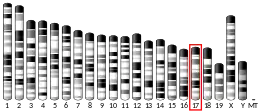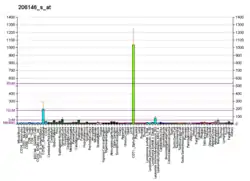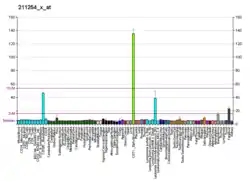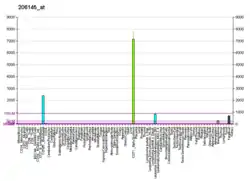RHAG
Rh-associated glycoprotein (RHAG) is an ammonia transporter protein that in humans is encoded by the RHAG gene.[5][6] RHAG has also recently been designated CD241 (cluster of differentiation 241). Mutations in the RHAG gene can cause stomatocytosis.[7]
Function
The Rh blood group antigens (MIM 111700) are associated with human erythrocyte membrane proteins of approximately 30 kD, the so-called Rh30 polypeptides. Heterogeneously glycosylated membrane proteins of 50 and 45 kD, the Rh50 glycoproteins, are coprecipitated with the Rh30 polypeptides on immunoprecipitation with anti-Rh-specific mono- and polyclonal antibodies. The Rh antigens appear to exist as a multisubunit complex of CD47 (MIM 601028), LW (MIM 111250), glycophorin B (MIM 111740), and play a critical role in the Rh50 glycoprotein [supplied by OMIM].[6]
See also
References
- GRCh38: Ensembl release 89: ENSG00000112077 - Ensembl, May 2017
- GRCm38: Ensembl release 89: ENSMUSG00000023926 - Ensembl, May 2017
- "Human PubMed Reference:". National Center for Biotechnology Information, U.S. National Library of Medicine.
- "Mouse PubMed Reference:". National Center for Biotechnology Information, U.S. National Library of Medicine.
- Matassi G, Chérif-Zahar B, Raynal V, Rouger P, Cartron JP (Jan 1998). "Organization of the human RH50A gene (RHAG) and evolution of base composition of the RH gene family". Genomics. 47 (2): 286–93. doi:10.1006/geno.1997.5112. PMID 9479501.
- "Entrez Gene: RHAG Rh-associated glycoprotein".
- Stewart AK, Shmukler BE, Vandorpe DH, Rivera A, Heneghan JF, Li X, Hsu A, Karpatkin M, O'Neill AF, Bauer DE, Heeney MM, John K, Kuypers FA, Gallagher PG, Lux SE, Brugnara C, Westhoff CM, Alper SL (Dec 2011). "Loss-of-function and gain-of-function phenotypes of stomatocytosis mutant RhAG F65S". American Journal of Physiology. Cell Physiology. 301 (6): C1325-43. doi:10.1152/ajpcell.00054.2011. PMC 3233792. PMID 21849667.
- Nicolas V, Le Van Kim C, Gane P, Birkenmeier C, Cartron JP, Colin Y, Mouro-Chanteloup I (Jul 2003). "Rh-RhAG/ankyrin-R, a new interaction site between the membrane bilayer and the red cell skeleton, is impaired by Rh(null)-associated mutation". The Journal of Biological Chemistry. 278 (28): 25526–33. doi:10.1074/jbc.M302816200. PMID 12719424.
This article incorporates text from the United States National Library of Medicine, which is in the public domain.
Further reading
- Bakouh N, Benjelloun F, Cherif-Zahar B, Planelles G (2006). "The challenge of understanding ammonium homeostasis and the role of the Rh glycoproteins". Transfusion Clinique et Biologique. 13 (1–2): 139–46. doi:10.1016/j.tracli.2006.02.008. PMID 16564724.
- Ripoche P, Goossens D, Devuyst O, Gane P, Colin Y, Verkman AS, Cartron JP (2006). "Role of RhAG and AQP1 in NH3 and CO2 gas transport in red cell ghosts: a stopped-flow analysis". Transfusion Clinique et Biologique. 13 (1–2): 117–22. doi:10.1016/j.tracli.2006.03.004. PMID 16574458.
- Ridgwell K, Spurr NK, Laguda B, MacGeoch C, Avent ND, Tanner MJ (Oct 1992). "Isolation of cDNA clones for a 50 kDa glycoprotein of the human erythrocyte membrane associated with Rh (rhesus) blood-group antigen expression". The Biochemical Journal. 287. 287 (1): 223–8. doi:10.1042/bj2870223. PMC 1133147. PMID 1417776.
- Avent ND, Ridgwell K, Mawby WJ, Tanner MJ, Anstee DJ, Kumpel B (Dec 1988). "Protein-sequence studies on Rh-related polypeptides suggest the presence of at least two groups of proteins which associate in the human red-cell membrane". The Biochemical Journal. 256 (3): 1043–6. doi:10.1042/bj2561043. PMC 1135522. PMID 3146980.
- Cherif-Zahar B, Raynal V, Gane P, Mattei MG, Bailly P, Gibbs B, Colin Y, Cartron JP (Feb 1996). "Candidate gene acting as a suppressor of the RH locus in most cases of Rh-deficiency". Nature Genetics. 12 (2): 168–73. doi:10.1038/ng0296-168. PMID 8563755. S2CID 1999844.
- Huang CH (Jan 1998). "The human Rh50 glycoprotein gene. Structural organization and associated splicing defect resulting in Rh(null) disease". The Journal of Biological Chemistry. 273 (4): 2207–13. doi:10.1074/jbc.273.4.2207. PMID 9442063.
- Hyland CA, Chérif-Zahar B, Cowley N, Raynal V, Parkes J, Saul A, Cartron JP (Feb 1998). "A novel single missense mutation identified along the RH50 gene in a composite heterozygous Rhnull blood donor of the regulator type". Blood. 91 (4): 1458–63. doi:10.1182/blood.V91.4.1458. PMID 9454778.
- Iwamoto S, Omi T, Yamasaki M, Okuda H, Kawano M, Kajii E (Feb 1998). "Identification of 5' flanking sequence of RH50 gene and the core region for erythroid-specific expression". Biochemical and Biophysical Research Communications. 243 (1): 233–40. doi:10.1006/bbrc.1997.8023. PMID 9473510.
- Huang CH, Liu Z, Cheng G, Chen Y (Sep 1998). "Rh50 glycoprotein gene and rhnull disease: a silent splice donor is trans to a Gly279-->Glu missense mutation in the conserved transmembrane segment". Blood. 92 (5): 1776–84. doi:10.1182/blood.V92.5.1776. PMID 9716608.
- Chérif-Zahar B, Matassi G, Raynal V, Gane P, Delaunay J, Arrizabalaga B, Cartron JP (Oct 1998). "Rh-deficiency of the regulator type caused by splicing mutations in the human RH50 gene". Blood. 92 (7): 2535–40. doi:10.1182/blood.V92.7.2535. PMID 9746795.
- Huang C, Cheng GJ, Reid ME, Chen Y (Jan 1999). "Rhmod syndrome: a family study of the translation-initiator mutation in the Rh50 glycoprotein gene". American Journal of Human Genetics. 64 (1): 108–17. doi:10.1086/302215. PMC 1377708. PMID 9915949.
- Huang CH, Cheng G, Liu Z, Chen Y, Reid ME, Halverson G, Okubo Y (Sep 1999). "Molecular basis for Rh(null) syndrome: identification of three new missense mutations in the Rh50 glycoprotein gene". American Journal of Hematology. 62 (1): 25–32. doi:10.1002/(SICI)1096-8652(199909)62:1<25::AID-AJH5>3.0.CO;2-K. PMID 10467273.
- Iwamoto S, Suganuma H, Kamesaki T, Omi T, Okuda H, Kajii E (Sep 2000). "Cloning and characterization of erythroid-specific DNase I-hypersensitive site in human rhesus-associated glycoprotein gene". The Journal of Biological Chemistry. 275 (35): 27324–31. doi:10.1074/jbc.M003297200. PMID 10862620.
- Marini AM, Matassi G, Raynal V, André B, Cartron JP, Chérif-Zahar B (Nov 2000). "The human Rhesus-associated RhAG protein and a kidney homologue promote ammonium transport in yeast". Nature Genetics. 26 (3): 341–4. doi:10.1038/81656. PMID 11062476. S2CID 21313219.
- Westhoff CM, Ferreri-Jacobia M, Mak DO, Foskett JK (Apr 2002). "Identification of the erythrocyte Rh blood group glycoprotein as a mammalian ammonium transporter". The Journal of Biological Chemistry. 277 (15): 12499–502. doi:10.1074/jbc.C200060200. PMID 11861637.
- Mouro-Chanteloup I, D'Ambrosio AM, Gane P, Le Van Kim C, Raynal V, Dhermy D, Cartron JP, Colin Y (Aug 2002). "Cell-surface expression of RhD blood group polypeptide is posttranscriptionally regulated by the RhAG glycoprotein". Blood. 100 (3): 1038–47. doi:10.1182/blood.V100.3.1038. PMID 12130520.
- Chen BS, Xu ZX, Xu X, Cai Y, Han YL, Wang J, Xia SH, Hu H, Wei F, Wu M, Wang MR (Sep 2002). "RhCG is downregulated in oesophageal squamous cell carcinomas, but expressed in multiple squamous epithelia". European Journal of Cancer. 38 (14): 1927–36. doi:10.1016/S0959-8049(02)00190-9. PMID 12204676.
- Dahl KN, Westhoff CM, Discher DE (Feb 2003). "Fractional attachment of CD47 (IAP) to the erythrocyte cytoskeleton and visual colocalization with Rh protein complexes". Blood. 101 (3): 1194–9. doi:10.1182/blood-2002-04-1187. PMID 12393442.
External links
- RHCE+protein,+human at the US National Library of Medicine Medical Subject Headings (MeSH)
- RhAG blood group system in the BGMUT blood group antigen gene mutation database
